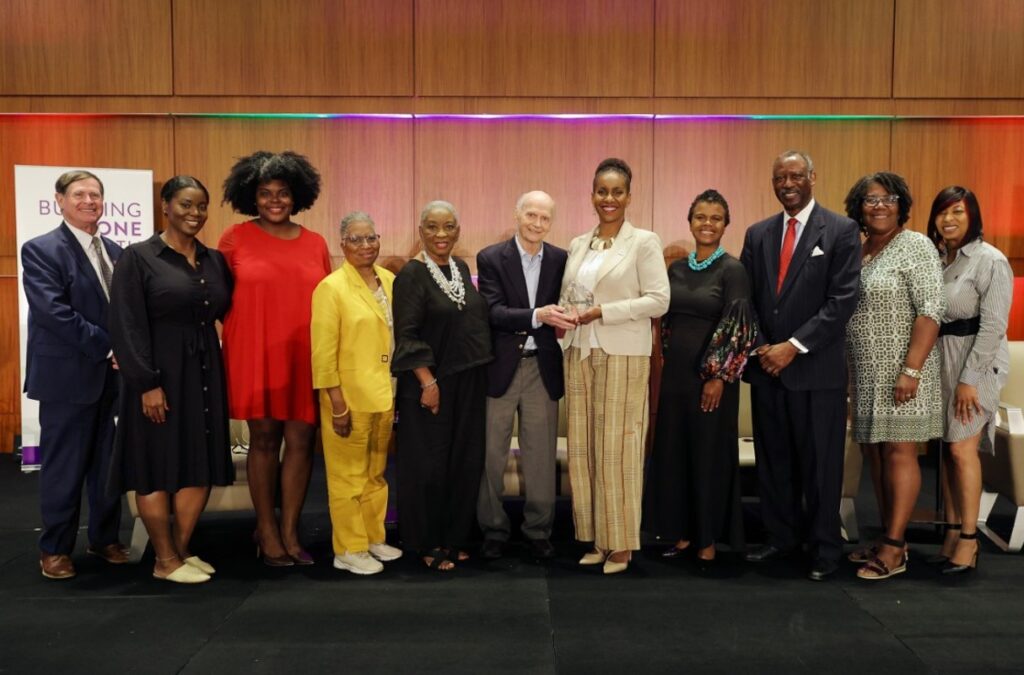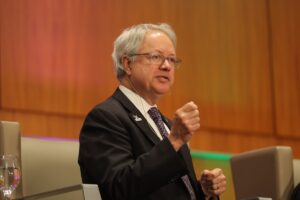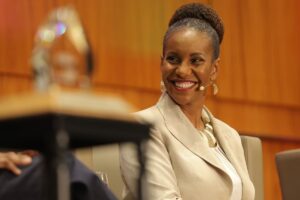
By Andy Brack | Now is the right time for the opening of an international museum dedicated to telling generations of stories stemming from the lives of enslaved Africans brutally brought to what became the United States.
And Charleston, where two of every five of the enslaved disembarked from cruel slaving ships that fueled chattel slavery, is the right place for it to be built.
Those two messages rang loud and clear May 10 when the Riley Institute at Furman University presented its second annual OneSouthCarolina Partners in Progress Award to the International African American Museum (IAAM) in a Columbia ceremony. The museum, fueled by $150 million in donations from individual, corporate, foundation, government and other institutional sources, will have a long-awaited opening June 27 after 23 years of hard work.

“This museum is needed now more than ever,” Charleston Mayor John Tecklenburg said passionately during a panel discussion, adding it would fill in the gaps to tell fuller stories to help explain ongoing disparities in American society caused by increasing denial, conflict and rancor. “I can’t believe the discussions going on in the school boards in our country,” he added, referring to divisive issues from book banning to so-called critical race theory that pull people apart.
“It’s a remarkable treasure for this state and our nation that we’re about to open.”
Not only will it connect White, tan, brown, Black and other Americans to richer looks at the history and culture that shaped the country, but its genealogical center will be a hub for connecting descendants of enslaved Africans to their family pasts. The museum will help to fill voids ignored by history books and allow many Americans to reclaim their family histories.
The museum, perched on the Cooper River, is combining its current transformative cultural mission with physical reminders through its location as a former slaving wharf.
“The site is powerful. It’s sacred,” Tecklenburg said. “This is one of the best buildings built in the city of Charleston in 353 years.”
Dr. Tonya Matthews, president and CEO of the IAAM, said the museum will be a site of pilgrimage where people can learn about their history. And for many, it will become transformative, personally.

“We’re providing the means for folks to unearth their own stories,” Matthews said during a panel discussion. Later she added, “We bring people here to learn. We are a site of journey and an end point for so many folks.”
And for Charleston and the South, which profited from slavery for generations, the IAAM will have a broader transformative role to spark discussion and better understanding of the past and present.
In a short film by SCETV at the start of the awards session, U.S. Rep. Jim Clyburn, the powerful South Carolina Democrat who served as the IAAM’s first board chairman, put the museum’s impact in perspective.
“This museum brings with it value,” he said. “It means that South Carolina is paying homage to the diversity of its citizens and that South Carolina is not running away from its history – that South Carolina is being true in our pursuit for a more perfect union.”
The development of the museum, which stemmed from an initiative by former Charleston Mayor Joseph P. Riley Jr., got a major boost after the devastating, sobering murders of nine worshippers at Emanuel AME Church in Charleston in 2015.
Current IAAM Chairman Wilbur Johnson reflected: “Out of some tragedies can come some good. That event catalyzed the feeling about what are we doing, what do we need to be going forward. As a result of that event, people began asking us what can we do to help. [They] recognized that the museum could be a central focus in dealing with some of the ills that were revealed with Mother Emanuel.”
The museum will be open 10 a.m. to 5 p.m. Tuesdays through Sundays starting June 27. Opening day tickets are sold out. More: IAAMuseum.org/
Andy Brack, recognized in 2022 as the best columnist in South Carolina, is editor and publisher of Statehouse Report and the Charleston City Paper. Have a comment? Send to: feedback@charlestoncitypaper.com. (If you didn’t figure it out, the song was “For what it’s worth,” by Buffalo Springfield, 1966.)
















 We Can Do Better, South Carolina!
We Can Do Better, South Carolina!